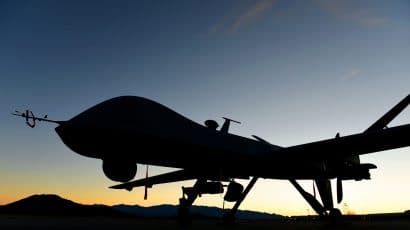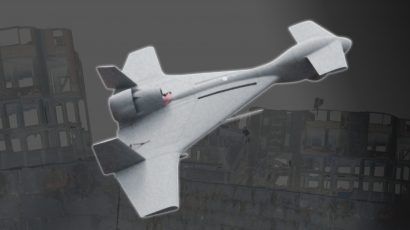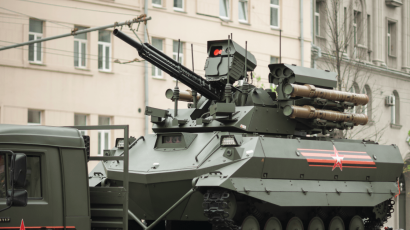Search results for autonomous weapon
In the debate over autonomous weapons, it’s time to unlock the “black box” of AI
As countries around the world race to incorporate AI and greater autonomous functionality into weapons, the years-long debate at the United Nations over what if anything to do about lethal autonomous weapons has not resulted in an answer. Here's one path forward.
Don’t fear the robopocalypse: Autonomous weapons expert Paul Scharre
A former Army Ranger—who happens to have led the team that established Defense Department policy on autonomous weapons—explains in a Bulletin interview what these weapons are good for, what they’re bad at, and why banning them is going to be a very difficult challenge.
The case for banning autonomous weapons rests on morality, not practicality
The failure of the chemical weapons ban in Syria is not a strike against a proposed global ban on autonomous weapons. Bans derive their strength from morality, not practicality.
Why “stupid” machines matter: Autonomous weapons and shifting norms
Should legal and regulatory norms be adjusted to address the threat of hyperintelligent autonomous weapons in the future? Maybe—but dumb autonomous weapons are altering norms right now.
Death of efforts to regulate autonomous weapons has been greatly exaggerated
Some say trying to use the Convention on Certain Conventional Weapons to pre-emptively ban lethal autonomous weapons systems has failed—and consequently should be abandoned. This argument is wrong.
Why the world needs to regulate autonomous weapons, and soon
If machines that autonomously target and kill humans are fielded by one country, it could be quickly followed by others, resulting in destabilizing global arms races. And that’s only a small part of the problem.
Stopping killer robots and other future threats
The campaign against fully autonomous weapons may be a road map for confronting tomorrow’s dangerous technologies
The struggle to ban killer robots
The campaign against lethal autonomous weapons is making progress, but to succeed it will have to answer some questions, including: What distinguishes killer software from non-killer software?
Ban killer robots? How about defining them first?
There's a lot of talk about regulating autonomous weapons, but thoughtful, effective policy will be difficult to make if we can’t even agree on what they are
Manifestos and open letters: Back to the future?
Why UN discussions on the management of lethal autonomous weapons need greater participation by the scientific and research communities and representatives of the private sector. Statements of alarm are not enough.
Top US Army official: Build AI weapons first, then design safety
A top US Army official advocates for lethal autonomous weapons.
The United Nations and the future of warfare
The United Nations has debated whether to ban lethal autonomous weapons for years now. As countries make rapid progress in the autonomous capabilities of weapons systems, will any ban be too late to prevent these weapons from being used at borders or in war?
Killer robots reconsidered: Could AI weapons actually cut collateral damage?
Although activists are calling for an international ban on lethal autonomous weapons, incorporating AI into weapons systems may make them more accurate and result in fewer civilian casualties during war.
To kill killer robots, a brief boycott
If your university partners with a defense contractor to research autonomous weapons, do not expect AI researchers to sit still for it.
Semi-autonomous and on their own: Killer robots in Plato’s Cave
To forestall threats from future killer robots, don’t ignore today’s “semi-autonomous” weapons
In Syria, Russia found the chance to showcase its swagger–and its robot weapons
The Syrian civil war gave Russia the chance to test and purportedly improve its robotic and autonomous weapons. Weapons makers showcased some of their products at a recent convention in Moscow.
The United States should drop its opposition to a killer robot treaty
Active US engagement in negotiating a relatively modest treaty offers the best hope for mitigating the humanitarian risks of autonomous weapons.
If a killer robot were used, would we know?
After a recent UN report suggested that a Turkish-made Kargu-2 had autonomously hunted down retreating troops in Libya, numerous media outlets devoted coverage to the issue of so-called lethal autonomous weapons. But much of the coverage misses an important point: It will be extremely difficult to verify if and when such a weapon is used.















